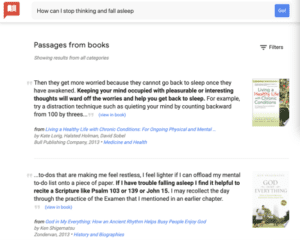Intro:
For this week’s case research, my partner Crystal and I studied a Google’s new AI experiment called “talk to books”. Here is the link to our presentation slides.
What is it? Why is it special?
Talk to Books is Google’s latest AI experiment that uses AI to talk to books and test word association skills. It is not a traditional means of searching engines that simply search webs and then give outputs with great relation to the keyword the users input. Instead, the algorithm of this AI is trained via machine learning on human conversations to predict the next response in a conversation. It doesn’t search the webs but the books. It allows users to explore ideas and discover books by getting quotes from books that respond to users’ queries. And since it is trained on human conversations, when users use natural language to speak to it in sentences, they will often get better results than keywords. It allows users to make a statement or ask a question, and the tool finds sentences in books that respond, with no dependence on keyword matching in a sense you are talking to the books, getting responses which can help you determine if you’re interested in reading them or not.

For example, when you type how can I stop thinking and fall asleep, it will give you quotes from books as an answer in an actual conversation. It makes users feel as if they’re making conversations to a real person rather than a machine giving outputs according to the input keyword.
How does it work? What are the techs involved?
It is hugely depending on the development of a sub-field of AI known as word vectors, a type of natural language understanding that maps semantically similar phrases to nearby points based on equivalence, similarity or relatedness of ideas and language. It’s a way to enable algorithms to learn about the relationships between words, based on examples of actual language usage. (Ray Kurzweil)
Potential Future Application
I think this experiment has laid the foundation for the future development of search engine, as well as the evolvement of how machine perceive human minds. For example, Siri can be even more understanding towards our commands, Google search can provide more personalized service, and technology can also appear to be less cold and more “human”. In addition to helping the existing technology develop, I believe this experiment may also shed light on the other innovative application such as an AI teacher. If the AI is able to really make conversations with users, it will make the users feel more at ease and encouraged to learn knowledge from it, rather than simply receiving answers from it.
source:
https://experiments.withgoogle.com/talk-to-books
https://ai.googleblog.com/2018/04/introducing-semantic-experiences-with.html